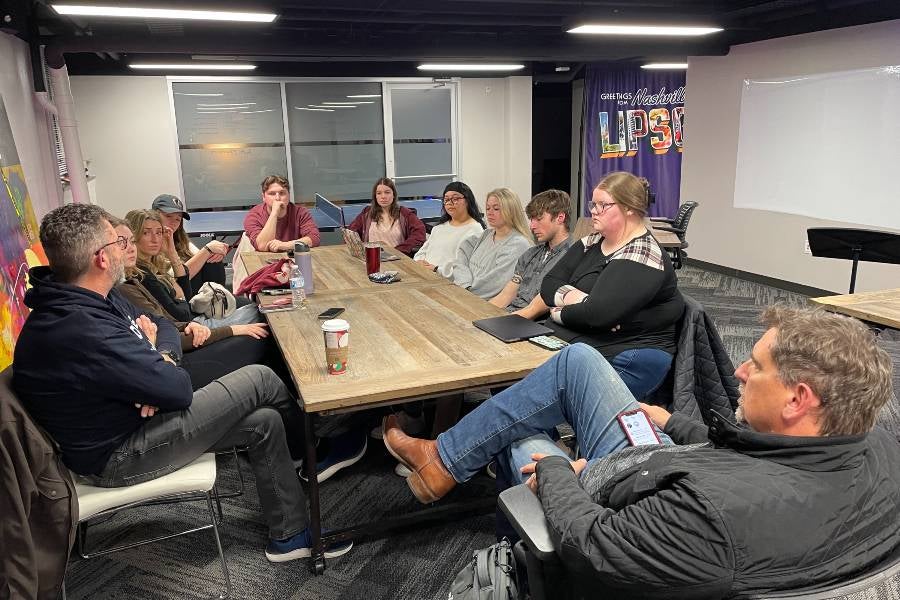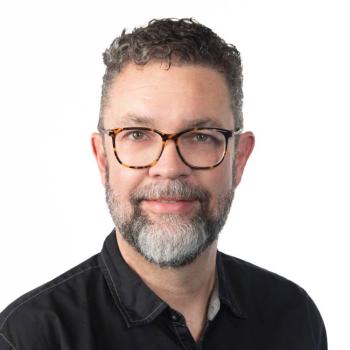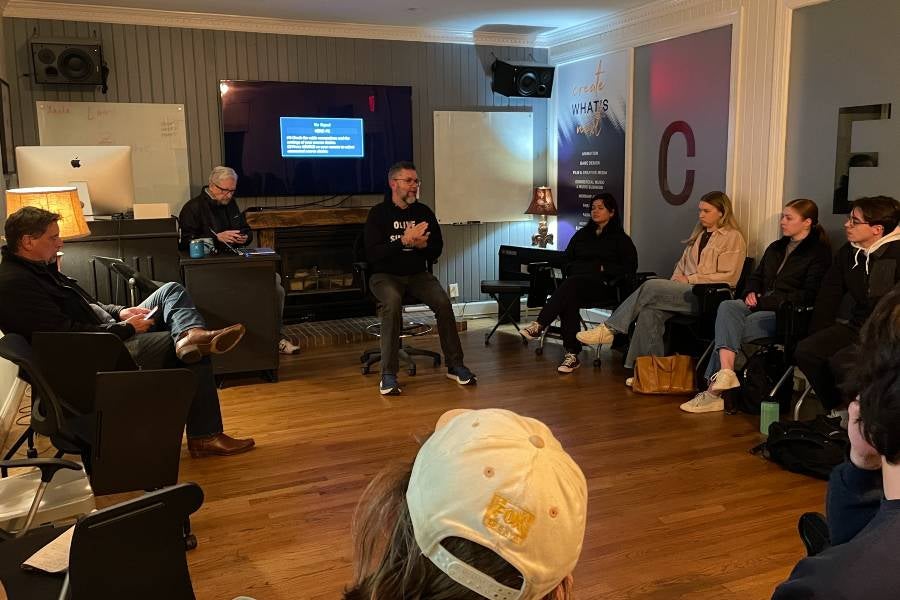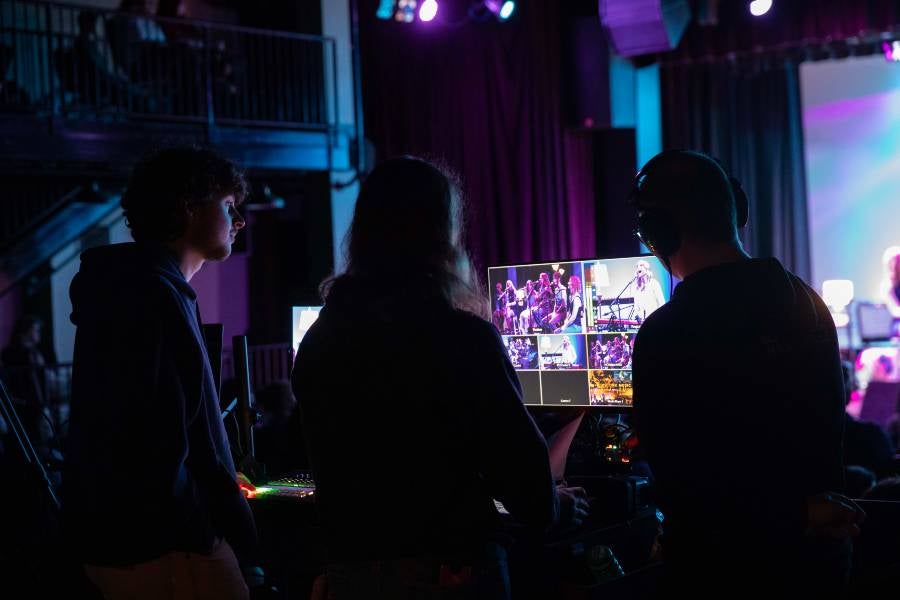Practicum courses provide students immersive experiences in music industry
Before they’ve even graduated, students in Lipscomb University’s George Shinn College of Entertainment & the Arts (CEA) are managing artist relations, building marketing campaigns, planning live music events and launching full-scale record releases.
Kim Chaudoin |

Red Dog Productions meets on Monday nights during the semester.
It’s all part of CEA’s innovative approach to preparing students for careers in the music industry as they turn classroom lessons into real-world industry experience. Students have immersive opportunities through several practicum courses designed to focus on various aspects of the music industry such as record label, live music and A&R semester-long practicum courses. To gain as much practical experience as possible, students often take more than one practicum. These opportunities are offered through the CEA’s Imagine House, Lipscomb’s professional production house, and the School of Music’s Music Industry Studies program.

John J. Thompson
Real-world artist development
Lipscomb’s Imagine House offers the Record Label Practicum, which is the brainchild of industry veterans Brown Bannister, director emeritus of Lipscomb’s School of Music and Grammy-winning producer; John J. Thompson, director of Lipscomb’s Music Industry Studies program who has over 30 years of experience working in the music industry, including with labels, publishers, festivals, and in production and artist development; and Rusty Harmon, adjunct music professor, president of Vere Music and former manager of Hootie & the Blowfish. Together, they bring decades of industry knowledge and a passion for mentoring the next generation. They joined forces to create a space where students don’t just study the music industry — they live it.
Thompson oversees practicum courses offered through Imagine House and Music Industry Studies and said the involvement of music industry veterans is an important feature of Lipscomb’s program.
“This is real-world experience most students wouldn’t get until years into their careers,” he said. “We have been blessed by the investment of adjunct faculty who are actively working in the industry, such as Rusty who is a well respected and connected label services agent and distributor.”

Brown Bannister
For Bannister, training up the next generation of music industry professionals through opportunities such as the Record Label Practicum is a calling.
“For decades, I’ve worked with developing artists to take them to the next level,” said Bannister. “This is the most meaningful project I’ve been part of in education, because it gives me the chance to take that experience and share it with 25 artists at once. It’s a chance to scale what I’ve done my whole career — and to do it with a purpose.”
Students in the Record Label Practicum class this past year formed A&R teams, conducted artist evaluations, launched a marketing campaign, crafted press kits, managed social media strategy and publicity, and collaborated on the release logistics all while guided by professionals like Harmon, whose firm is partnering on distribution.
“This has been a dream of mine for over 30 years,” Harmon said. “I’ve tried to get something like this started at other universities, but it takes a rare combination of student talent, institutional support and industry infrastructure to make it real. Lipscomb has all of that and the students are incredible.”
One evening a week during the semester, the Record Label Practicum met in the Contemporary Music House (known affectionately as the COHO) or the CEA Dean’s Suite, and gave students the opportunity to be on the front lines of every facet of a real record release. Nashville Americana duo River and Rail served as Imagine House’s first record label client. Leading up to the group’s single release in April, students were involved in everything from A&R scouting and strategic marketing to developing social media content and writing press releases. It’s an experience that mirrors the inner workings of a professional label.
“We’re not just teaching students how to produce or perform music,” says Bannister. “We’re teaching them how to turn that passion into a sustainable career.”
The Record Label Practicum was divided into functional teams — publicity, content creation and social media — each with real deliverables. Students created media kits, conducted artist audits, wrote press materials, scheduled pre-release campaigns and coordinated a full content calendar. The release strategy aligns with professional industry practices, including playlist pitching to ADA/Warner Music and coordinating with distributors for digital rollout.

Nashville Americana duo River and Rail signed on as Imagine House’s first record label client.
Freshman music industry major Elissa Perkins said the class helped her not only grow professionally, but also personally. “I wasn’t expecting to connect with the artist on such a deep level,” she said. “It added a whole new dimension to the music.”
Luke Cooper, a freshman songwriting major, shared that he entered the program thinking you could “just upload a song and that’s it.” “I’ve learned so much about what it actually takes to get a song heard and what goes on behind the scenes,” he shared.
Beyond the technical skills, Harmon and Bannister are also teaching students other critical skills to set them up for future career success — collaboration and humility.

Students in the Record Label Practicum formed A&R teams, conducted artist evaluations, launched a marketing campaign, crafted press kits, managed social media strategy and publicity, and collaborated on release logistics for clients..
“This class is a good example of that … with different people who have different focuses and different goals. We're learning to work together now, because that's what you do,” said Bannister. “When you get out into the real world, you work with all sorts of different skill sets and disciplines. You don’t get very far in this business alone. This practicum teaches students to serve and elevate others which is a principle that’s just as important as anything they’ll find in a textbook.”
Katerina Hopp said through the Record Label Practicum she learned a lot about the importance of collaboration. “Many of the students in this class are freshmen,” said the freshman music and psychology major. “It’s so cool to see what Lipscomb is letting us do!”
“This class has given me a greater appreciation of the team that will be supporting me when I release music one day,” added Andrew Barre, a freshman songwriting major.
Learning on stage and behind the curtain
Meanwhile, a few yards down the street from the COHO every Thursday night during the school year, live music can be heard on the stage at The Well across the street from Lipscomb’s campus. That’s thanks to Red Dog Productions, the one-of-a-kind live music practicum experience where students don't just learn about the live music industry but are actually working in it.
Red Dog Productions, which meets on Monday nights during the semester, gives students the chance to produce weekly live concerts entirely on their own. Students, many of whom are music industry studies majors, do it all — booking, promoting, producing, hosting, managing sound and lights. Each student rotates through roles, gaining exposure to every element of live music production.
“A program like this is an excellent way for these students to develop experiential knowledge before they hit the workforce. They’re not watching someone else do it. They’re doing it and learning to own the process,” said Thompson. “It is great getting to watch these students in action … watching them problem-solve, interact with artists, handle logistics and enjoy the fruits of their efforts in these live performances each week.”
Now in its second year since being fully reimagined, the Live Music Practicum, which students branded as Red Dog Productions, has grown from a fledgling concept to a polished and professional operation that produces as many as 14 shows in a single semester, Thompson said. In addition to the live performances at The Well, the practicum students also helped plan and produce last year’s Wild Bison Fest and this spring’s Mild Bison Mini-Fest in partnership with The Arcadian Wild.
Harmon believes this model is unique. “Some schools do one event a year. These students are putting on 14 over about a three-month period during a semester. This isn’t theory — it’s muscle memory. And that’s what employers are going to care about.”
For students like junior Shenize Bekker, the experience has been transformative. “I’ve always loved going to live shows,” she said. “But working behind the scenes, I discovered I want to make this my career. I have found a love for behind-the-scenes work. It’s more fun and more rewarding than I ever imagined. This experience has helped me figure out my career path.”
“Now I understand how to do all of this and maintain relationships,” she continued. “This has been a big learning experience for me.”
Sophomore Bella Varela handled hosting responsibilities, including coordinating with artists, announcing shows and working with sponsors like the campus bookstore for giveaways. “We’re the voice of the event,” she said. “We want everyone to feel welcome and excited.”

Red Dog Productions Red Dog Productions gives students the chance to produce weekly live concerts entirely on their own.
On the marketing side, students built a cohesive brand identity from scratch. “At the beginning, our social media was all over the place,” said Gabby Armitage, a junior from Prior Lake, Minnesota. “Now we have learned to use consistent color palettes, plan content and collaborate with animation students. It feels professional.”
Meanwhile, sound and lighting became a crash course in technical production. “I had never set up a full show before,” said Caiden Becker, part of the production team. “Now I can walk into a space and know how to mic a band and run a show start to finish.”
Nathan Phillips, a sophomore from Fayetteville, Pennsylvania, who focused on lighting, said his skills also grew over the semester. “Getting to learn a lot about lighting at the beginning of the semester was important because I had never worked with lighting before,” he explained. “Throughout the semester I learned to build full light shows with cues, spotlights and blackouts.”
“Every week we talked about what worked and what didn’t,” said Harmon. “They learned by doing, by failing and by adjusting. That’s what builds confidence.”
Thompson said during the course of having students plan these live events they tried to “turn disasters into learning experiences.” “It’s about the process of learning,” he explained. “The students learned it ‘in the wild’ and then replicated what worked and stopped doing what didn’t.”
Senior Emily Kirby took several semesters of the practicum, some for credit while others were just voluntary to continue learning. “I remember that we started this practicum with almost nothing … no audience, no presence,” she shared. “There has been a lot of growth in how we work together. We’ve built a brand, a rhythm and even hosted successful paid ticketed events. We have refined our processes and are leaving behind detailed information to help the next group of practicum students pick up where we leave off.”
“I transferred in from another school my sophomore year and so I kind of got thrown into the fire,” Kirby recalled. “We had to build this from scratch and watching it grow is awesome.”
Varela said she learned valuable lessons as a member of Red Dog Productions. “When I started this class, I quickly learned that planning live events was more difficult than I thought,” she admitted. “But there were also some very pleasant surprises along the way and incredible experiences. I learned so much through trial and error and being able to try to find solutions on my own.”

Rusty Harmon
The learning doesn’t end when the semester does. Students leave behind a guidebook of procedures, templates and lessons learned for the next group to build on. The team has also produced instructional videos to pass along their knowledge.
“It’s not just about this semester,” said Thompson. “We’re creating institutional knowledge and mentoring future cohorts. That’s how you scale impact.”
The practicum’s vision extends beyond Lipscomb to grow Red Dog’s presence across Nashville, tapping into the city’s vibrant music scene.
“It is amazing to have a ‘lab’ across the street at The Well, but we would love to move to bigger venues and bring in bigger artists while still being student-run,” said Harmon.
With new artists and releases on the horizon, Red Dog Productions is just getting started. “This is more than an academic exercise,” Harmon concluded. “This is a launchpad.” Follow Red Dog Productions at @Red_Dog_Pro.
Thompson said more practicum courses are currently in development for the future, including a booking and artist management practicum and a music publishing practicum.
For more information about the School of Music visit, www.lipscomb.edu/music and learn more about the George Shinn College of Entertainment & the Arts at www.lipscomb.edu/cea.